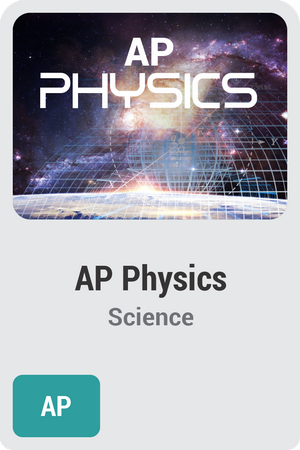
Course Overview:
Uncover the mysteries that explain all phenomena in the universe. In this course, you will develop an understanding of physics through rich content, problem solving, and inquiry-based investigations in an algebra-based, introductory college-level course. You will create visual representations of physical phenomena as you explore dynamic concepts in the areas of motion, force, energy, momentum, and fluids. You will apply science practice skills when you engage in real-world and theoretical examples related to physical models, systems interactions, conservation laws, and experimental design. Get ready to make sense of the natural events witnessed in our universe!
Per College Board's Appropriate Grade Level Policy—students enrolling in AP courses with FLVS must be entering ninth grade to have AP designation affixed to their transcript at course completion. By signing up for an AP course with FLVS, you are agreeing to the College Board’s policy.
Prerequisites:
Algebra 1, Geometry
Required Materials:
Student-Supplied Resources
Students will need the following materials to complete the coursework:
- Calculator: four function, scientific, graphing
- Lab and Activity: View the materials you will need for each Segment.
Segment One Materials
- Graph paper
- Stopwatch (records time to two decimal places); This can be one online, one on a mobile device, or a hand-held one.
Segment Two Materials
- Pencil
- Washers or paper clips
- String, yarn, or rope
- Stopwatch (records time to two decimal places); This can be one online, one on a mobile device, or a hand-held one.
- A protractor
Syllabus:
Segment One
Module 01: Kinematics
- 01.00 Kinematics Introduction
- 01.01 Measurement and position
- 01.02 Scalars, Vectors, and Velocity
- 01.03 Constant Motion
- 01.04 Acceleration
- 01.05 Kinematics Checkpoint
- 01.06 One-Dimensional Motion Problems
- 01.07 Motion Graphs
- 01.08 Reference Frames and Relative Motion
- 01.10 Kinematics Exam
Module 02: 2D Motion and Forces
- 02.00 Motion and Forces Introduction
- 02.01 Vectors and Motion in Two Dimensions
- 02.02 Projectile Motion
- 02.03 Two-Dimensional Motion Lab
- 02.04 Understanding Forces
- 02.05 2D Motion and Forces Checkpoint
- 02.06 Second Law of Motion
- 02.07 Equilibrium
- 02.08 Linear Dynamics
- 02.10 Motion and Forces Exam
Module 03: Translational Dynamics
- 03.00 Translational Dynamics Introduction
- 03.01 Gravitational Force
- 03.02 Normal and Friction Forces
- 03.03 Spring Forces
- 03.04 Translational Dynamics Checkpoint
- 03.05 Circular Motion
- 03.06 Dynamics of Circular Motion
- 03.07 Circular Orbits
- 03.09 Translational Dynamics Exam
Module 04: Energy
- 04.00 Energy Introduction
- 04.01 Systems and Energy
- 04.02 Work and Kinetic Energy
- 04.03 Potential and Thermal Energy
- 04.04 Energy Checkpoint
- 04.05 Conservation of Energy
- 04.06 Conservation of Energy Lab
- 04.07 power
- 04.09 Energy Exam
Segment Two
Module 05: Momentum
- 05.00 Momentum Introduction
- 05.01 Momentum and Impulse
- 05.02 Representing Changes in Momentum
- 05.03 Conservation of Momentum
- 05.04 Momentum Checkpoint
- 05.05 Collisions
- 05.06 Collisions Lab
- 05.08 Momentum Exam
Module 06: Rotational Dynamics
- 06.00 Rotational Dynamics Introduction
- 06.01 Rotational Motion
- 06.02 Torque
- 06.03 Rotational Inertia
- 06.04 Rotational Dynamics Checkpoint
- 06.05 Rotational Equilibrium
- 06.06 Newton’s Second Law for Rotation
- 06.07 Rotational Kinetic Energy and Work
- 06.09 Rotational Dynamics Exam
Module 07: Rotating Systems and Oscillations
- 07.00 Rotating Systems and Oscillations Introduction
- 07.01 Angular Momentum
- 07.02 Rotational Motion Lab
- 07.03 Motion of Orbiting Satellites
- 07.04 Rotating Systems or Oscillations Checkpoint
- 07.05 Oscillatory Motion
- 07.06 Simple Harmonic Motion
- 07.07 Pendulum Motion
- 07.09 Rotating Systems and Oscillations Exam
Module 08: Fluids
- 08.00 Fluids Introduction
- 08.01Internal Structure and Density
- 08.02 Pressure
- 08.03 Fluids and Newton's laws
- 08.04 Fluids Checkpoint
- 08.05 Fluids and Conservation Laws
- 08.06 Fluids Lab
- 08.08 Fluids Exam


